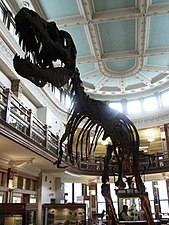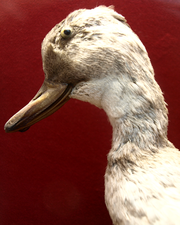Redpath Museum
 | |
 | |
| Established | 1882 |
|---|---|
| Location | 859 Sherbrooke Street West, Montreal, Quebec, Canada |
| Type | Museum of natural history |
| Director | Catherine Turgeon |
| Public transit access | |
| Website | www.mcgill.ca/redpath |

The Redpath Museum is a museum of natural history belonging to McGill University[1] and located on the university's campus on Sherbrooke Street West in Montreal, Quebec, Canada. It was built in 1882 as a gift from the sugar baron Peter Redpath.[2]
It houses collections of interest to ethnology, biology, paleontology, and mineralogy/geology.[1] The collections were started by some of the same individuals who founded the Smithsonian and Royal Ontario Museum collections. The current director is Catherine Turgeon. Commissioned by Redpath to mark the 25th anniversary of Sir John William Dawson's appointment as Principal, the Museum was designed by A.C. Hutchison and A.D. Steele. McGill University's Redpath Museum website characterizes it as an "idiosyncratic expression of eclectic Victorian Classicism" as well as "an unusual and late example of the Greek Revival in North America."[3]
It is the oldest building built specifically to be a museum in Canada.[1][4] Both the museum's interior and exterior have been utilized as a set, for movies and commercials. [citation needed]
Collections
[edit]-
Signature dinosaur skeleton within the Redpath Museum, set against interior Beaux Art decorations
-
View of the Gorgosaurus in the central evolution exhibit atrium
-
Redpath Museum Collection – fossilized scallops
-
Redpath Museum Collection – Claudiosaurus germaini
-
Redpath Museum Collection – Marrella splendens
-
Redpath Museum Collection – Limnoscelis
-
Redpath Museum Collection – Pecopteris bucklandi
-
Redpath Museum Collection – Labrador duck
-
Redpath Museum Collection – Dendrerpeton
-
Redpath Museum Collection – Carolina parakeet
-
Skeleton of an anaconda
Geology (mineralogy)
[edit]Five collections, containing approximately 16,000 specimens from all over the world, are identified by their initial letters:
- 'D' Doell collection for Dr Donald Doell, a physician who contributed many of the more recent materials in the collection.
- 'F' Ferrier collection for Walter Frederick Ferrier, famous mining engineer who contributed this pre-eminent collection of minerals from many classic locations.
- 'J' Jeffrey collection for Jeffrey de Fourestier, mineralogist and former volunteer at the museum.
- 'P' Palache collection for Charles Palache, mineralogist and Harvard professor.
- 'SC' Shirley Collection for the wife of Sir Hugh Graham, 1st Baron Atholstan who donated the collection in the early 1880s.
- 'NS' New System collection for the general collection catalogue. This collection contains the main body of specimens including the collection of the former Natural History Society of Montreal and specimens from the collection of Lord Strathcona.
Entomology
[edit]The Lyman entomology collections were transferred in 1961 by D. Keith McE. Kevan to Macdonald Campus in Sainte Anne-de-Bellevue, leading to the creation of the Lyman Entomological Museum and Research Laboratory.
Paleontology
[edit]The museum's important collection of fossils owes much of its beginning to Sir William Dawson who provided not only many of the fossils of plants from his native Nova Scotia, but procured many important specimens from around the world. Dr Thomas Clark, for many years up until his death, was a fixture at the museum and was renowned for his pioneering work on fossils from the Burgess Shale, some of the oldest known anywhere.
Ethnology
[edit]The ethnological and archeological collection is one of the oldest in North America and began with Sir William Dawson's collection. It received further material from the Natural History Society of Montreal. It now has over 17,000 items from Africa, ancient Egypt, Oceania, paleolithic Europe and South America. The collection of First Nations artifacts that were once part of the collection now are housed in the nearby McCord Museum in Montreal.
Affiliations
[edit]The Museum is affiliated with: CMA, CHIN, and Virtual Museum of Canada.
Metro
[edit]The museum, accessible by walking from many downtown Montreal locations, is also near the McGill station on the Montreal Metro Green Line.
See also
[edit]References
[edit]- ^ a b c Collins, Leah (24 April 2019). "It's like something out of a storybook, and it's in Montreal: An artist's tour of the Redpath Museum". CBC Arts. Retrieved 27 April 2019.
- ^ Bronson, Susan. The Design of the Peter Redpath Museum at McGill University: The Genesis, Expression, and Evolution of an Idea About Natural History. September 1992 (17:3), p. 60-76.
- ^ "Tea and Fossils: History of the Peter Redpath Museum", mcgill.ca; accessed March 20, 2017.
- ^ "About the Museum", "McGill University". Accessed May 11, 2008.
External links
[edit]- Redpath Museum
- Redpath Museum Biodiversity website Archived 2009-05-06 at the Wayback Machine
- Images Archived 2004-02-13 at the Wayback Machine
- Lyman Entomological Museum and Research Laboratory
- 360 interactive panorama featuring the Albertosaurus in the Dawson gallery
- Photograph:Redpath Museum, 1883 - McCord Museum
- Photograph:Redpath Museum, 1913 - McCord Museum
- Photograph:Interior of Redpath Museum, about 1893 - McCord Museum












